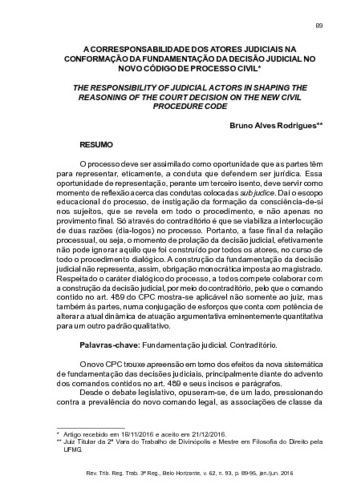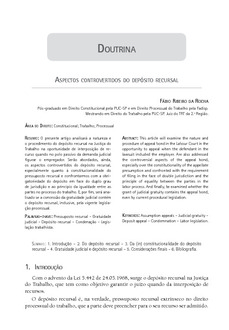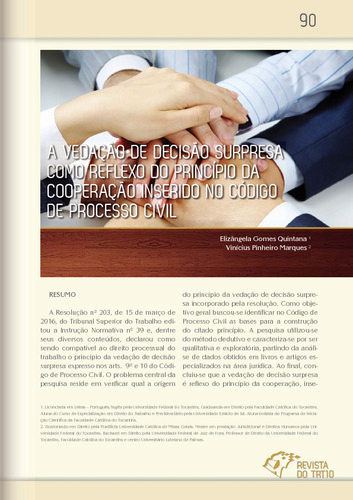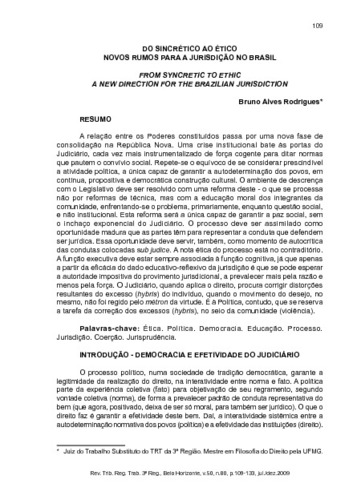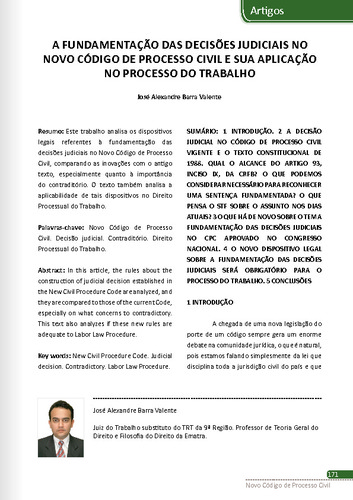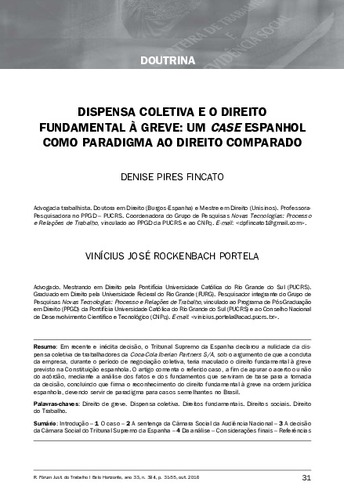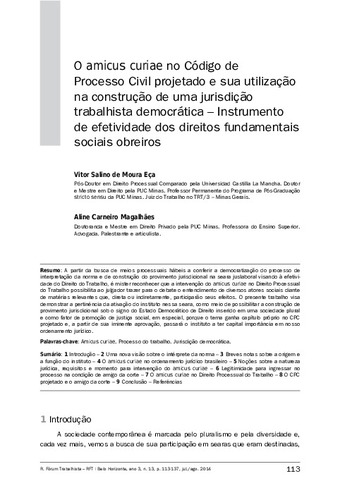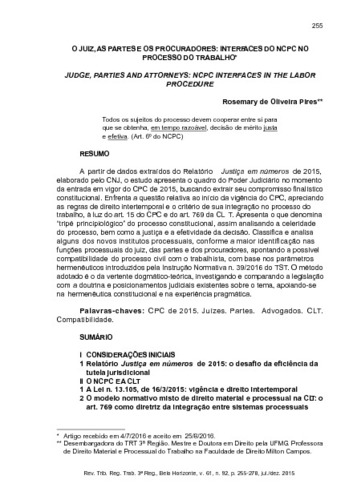Artigo de periódico
A corresponsabilidade dos atores judiciais na conformação da fundamentação da decisão judicial no novo Código de processo civil
| dc.contributor.author | Rodrigues, Bruno Alves | |
| dc.date.accessioned | 2017-08-21T18:32:18Z | |
| dc.date.available | 2017-08-21T18:32:18Z | |
| dc.date.issued | 2016-06 | |
| dc.identifier.citation | RODRIGUES, Bruno Alves. A corresponsabilidade dos atores judiciais na conformação da fundamentação da decisão judicial no novo Código de processo civil = The responsibility of judicial actors in shaping the reasoning of the court decision on the new civil procedure Code. Revista do Tribunal Regional do Trabalho da 3ª Região, Belo Horizonte, v. 62, n. 93, p. 89-95, jan./jun. 2016. | pt_BR |
| dc.identifier.uri | https://hdl.handle.net/20.500.12178/109932 | |
| dc.description.abstract | [por] O processo deve ser assimilado como oportunidade que as partes têm para representar, eticamente, a conduta que defendem ser jurídica. Essa oportunidade de representação, perante um terceiro isento, deve servir como momento de reflexão acerca das condutas colocadassub judice. Daí o escopo educacional do processo, de instigação da formação da consciência-de-si nos sujeitos, que se revela em todo o procedimento, e não apenas no provimento final. Só através do contraditório é que se viabiliza a interlocução de duas razões (dia-logos) no processo. Portanto, a fase final da relação processual, ou seja, o momento de prolação da decisão judicial, efetivamente não pode ignorar aquilo que foi construído por todos os atores, no curso de todo o procedimento dialógico. A construção da fundamentação da decisão judicial não representa, assim, obrigação monocrática imposta ao magistrado. Respeitado o caráter dialógico do processo, a todos compete colaborar com a construção da decisão judicial, por meio do contraditório, pelo que o comando contido no art. 489 do CPC mostra-se aplicável não somente ao juiz, mas também às partes, numa conjugação de esforços que conta com potência de alterar a atual dinâmica de atuação argumentativa eminentemente quantitativa para um outro padrão qualitativo. | pt_BR |
| dc.description.abstract | [eng] The process should be assimilated as an opportunity that the parties have to represent ethically conduct that claim to be legal. This opportunity of representation to a third party free, should serve as a moment of reflection on the conduct placed sub judice. Hence, the educational scope of the process of instigating the formation of self-consciousness itself the subject, which is revealed in the whole procedure, and not just at the end provision. Only through contradictory it is that it enables the interchange of two reasons (dia-logos) in the process. Therefore, the final phase of the procedural relationship, the time of delivery of the judgment, effectively can not ignore what has been built by all the actors in the course of all the dialogical procedure. The construction of the court decision is not grounds thus monocratic obligation on the magistrate. Subject to the dialogical character of the process, everyone should collaborate with the construction of the court decision by the contradictory, so the command contained in art. 489 of the CPC appears to be applicable not only to the judge, but also to the parties in joint efforts that has power to change the current dynamics of quantitative eminently argumentative performance to another quality standard. | pt_BR |
| dc.language.iso | pt_BR | pt_BR |
| dc.relation.ispartof | Revista do Tribunal Regional do Trabalho da 3ª Região: vol. 62, n. 93 (jan./jun. 2016) | pt_BR |
| dc.subject | Decisão judicial, Brasil | pt_BR |
| dc.subject | Motivação da sentença, Brasil | pt_BR |
| dc.subject | Contraditório, Brasil | pt_BR |
| dc.title | A corresponsabilidade dos atores judiciais na conformação da fundamentação da decisão judicial no novo Código de processo civil | pt_BR |
| dc.title.alternative | The responsibility of judicial actors in shaping the reasoning of the court decision on the new civil procedure Code | pt_BR |
| dc.relation.references | Brasil. Código de processo civil (2015), art. 357; art. 489 | pt_BR |
| dc.type.genre | Artigo de periódico | pt_BR |
| dc.identifier.rvbisys | 001102752 | |
| dc.relation.ispartoflink | https://hdl.handle.net/20.500.12178/109560 | pt_BR |
| dc.relation.referenceslink | http://www.lexml.gov.br/urn/urn:lex:br:federal:lei:2015-03-16;13105 | pt_BR |
This item appears in the following Collection(s)
-
Artigos9527


